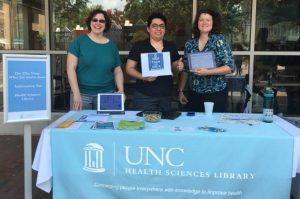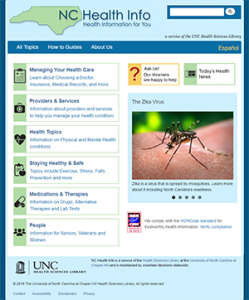View from the 5th – September 2016

September 2016 – Partnerships for a Healthy Public

I am so delighted to have begun my tenure as Director & Associate University Librarian for the Health Sciences Library in July. My first three months have been exciting and provided me the opportunity to meet with numerous people across the health affairs schools, University Library, and community. During those meetings, I’ve heard a number of perspectives on what makes the HSL such an integral partner in advancing Carolina’s mission. I’ve heard repeated praise for our talented team of librarians who support teaching, learning, research, and health care; for our rich collection of resources that we purchase and make discoverable for Tar Heels in Chapel Hill and across the globe; for our thoughtful integration of technology to innovate and help advance the next round of scientific discoveries; and for HSL’s dedication to providing reliable health information to the public.
In this issue, we’ll highlight just a few ways the HSL supports and collaborates to provide consumer health information. First, you’ll read about our recently created an Opioid Dependence Resource Guide, designed to help health care practitioners combat the national opioid addiction crisis. Next, you’ll learn about our past responses to the public health issues of Zika and Ebola. Finally, you’ll read about our consumer health website NC Health Info, which has been providing reliable information to the public for over 13 years.
Each of these stories reflect our mission of service, and highlight the HSL’s ability to be responsive to the constantly changing health care needs of our community. Being proactive and having the ability to effectively respond in this way requires a talented staff, and the generous support of donors like you. Thank you for all you have done to help make the HSL one of the best academic research libraries in the country. I look forward to making this library even better, as an essential partner and hub for groundbreaking knowledge discovery, innovation and collaboration, with your continued support.
Sincerely,
Dr. Nandita Mani
Director of the Health Sciences Library
Associate University Librarian for the Health Sciences
New Guide to Help Address National Opioid Epidemic
Collaborative Responses to Public Health Needs
Consumer Health Information for Your Everyday Needs
New Guide to Help Address National Opioid Epidemic
In response to the national opioid addiction crisis, the Health Sciences Library has created an Opioid Dependence Resource Guide for clinicians. The guide, which launched in early September but will be regularly updated, features research, clinical guidelines, continuing education courses, and other resources related to opioid addiction.
“This opioid dependence guide will be an incredibly useful resource for clinicians across North Carolina,” said Dr. Warren Newton, Director of the North Carolina Area Health Education Center (AHEC) Program and Vice Dean for the School of Medicine at the University of North Carolina at Chapel Hill. “Being able to easily access the most current research and reports on opioid addiction will be a key tool in fighting the national addiction crisis.”
The guide was created by Public Health and Outreach Librarian Brenda Linares and AHEC Digital Library Director Mary Beth Schell. The resources it contains are carefully selected and reflect the latest scientific information related to opioid addiction. In addition, the resources are all freely available so anyone interested in learning more about the topic will have access to the information.
In 2014 more than 28,000 people died from opioid overdose, with at least half of those deaths involving prescription opioids. Since 1999 deaths from prescription opioids have quadrupled. According to the Department of Health and Human Services, the health and social costs related to prescription opioid abuse are about $55 billion per year.
Collaborative Responses to Public Health Needs
The Opioid Dependence Guide is just the latest example of the Health Science Library’s (HSL) responding to a public health crisis. Earlier in 2016 HSL librarians created a guide dealing with the Zika virus, and in 2014 librarians partnered with Carolina faculty and clinicians to help prepare the campus for a potential Ebola outbreak.

The HSL’s Zika guide features information on how to protect against Zika, a map of the virus’ outbreak, and the latest clinical resources related to Zika. Former Collections Development Librarian Susan Swogger and Global Public Health Librarian Mary White created the guide in response to the outbreak of the virus, and had presented the guide at the May 2016 Medical Library Association annual meeting.
Swogger, White, and Outreach Librarian Brenda Linares shared the guide and other resources at a campus-wide information fair on June 30, 2016, joining representatives from UNC Global, the UNC School of Medicine, the Department of Environment Health and Safety, and the Campus Travel Clinic.
Following the first cases of Ebola in the United States, a response team was formed in Carolina’s School of Nursing that included Nursing Liaison Librarian Elizabeth Moreton. The team developed simulation exercises to respond to Ebola on campus, organized a town hall meeting to educate the campus community, and prepared a resource guide to share Ebola-related resources with health care staff, faculty, and interested students.
The guide focused on evidence-based resources for the clinical environment in North Carolina, rather than international or consumer-focused information. Because Ebola information was constantly evolving, the team collaborated on the guide to ensure that the resources, news, and factual information were consistently updated.
Consumer Health Information for Your Everyday Needs
Providing health information to the public is a core part of the Health Science Library’s mission. In addition to targeted responses to public health needs, the library provides reliable, easy-to-use information to the public through our consumer health website NC Health Info.

NC Health Info’s resources are grouped into categories such as health topics, providers and services, and medications and therapies. There are also sections dedicated to health topics pertinent to specific populations, such as senior health, women’s health, and health information for veterans.
In addition to providing resources about traditional health topics, NC Health Info has guides for consumers who want to learn more about health insurance, choosing a doctor or health care service, getting a second opinion, electronic health records, and other topics related to becoming a better informed patient. The website, which is available in English and Spanish, also recently added information about mobile apps and support groups.
NC Health Info was first developed by the Health Sciences Library in collaboration with the National Library of Medicine (NLM), and the UNC-Chapel Hill School of Information and Library Science. Funded by the NLM, a part of the National Institutes of Health, it was launched in January 2003. NC Health Info was recently redesigned to be more user friendly, and to launch a mobile version of the website for the first time.






